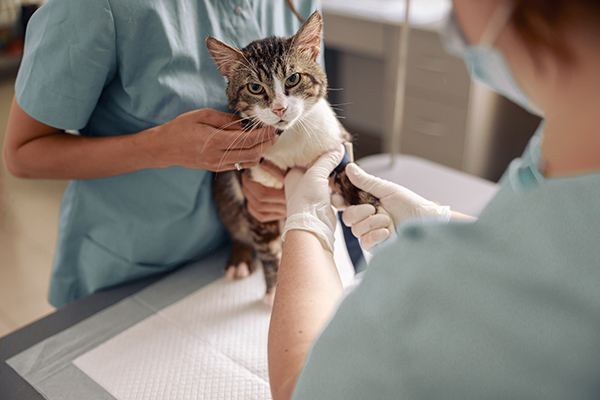Are you interested in working with animals? With two-thirds of Australians owning pets, a career in veterinary nursing is guaranteed to provide new challenges and learning opportunities. Becoming a vet nurse requires a Certificate IV in Veterinary Nursing, an ambitious attitude and a willingness to learn. Explore your future as a veterinary nurse in this informative article, detailing the tasks, skills, courses, and salary of this exciting career.

What is a Veterinary Nurse?
Vet nurses, also known as veterinary technicians, assist veterinarians in treating sick or injured animals. A vet nurse may work in various settings, including traditional veterinary clinics, animal hospitals, farms, and zoos. This position has a wide range of responsibilities and is frequently advertised on a full-time basis. Vet nurse positions also have the possibility of overtime, weekend, and night shifts depending on the clinic you work at. So what else can you expect from this career?
What Does a Vet Nurse Do?
Vet nurses are a crucial part of a successful veterinary practice, completing various technical, administrative and healthcare-focused tasks supporting the clinic’s veterinarians. These duties typically include:
- Proactive owner education: discussing procedures and general health care with owners.
- Diagnostic testing: analysing pathology samples and testing results to correctly diagnose an animal.
- Cleaning: maintaining a hygienic standard and sanitising rooms, equipment and tools.
- Administration: scheduling appointments, answering phones and processing payments.
- Surgical assistance: preparing animals for surgery and assisting with surgery.
This list is just a snapshot of the various tasks you will be entrusted with as a vet nurse, with responsibilities varying according to your level of qualification, experience, and position. Completing the duties that come with veterinary nursing requires many interpersonal skills.
Vet Nurse Skills
Becoming a vet nurse requires more than just a desire to work with animals. A wide range of skills and interpersonal abilities are necessary for successful employment. Some valuable qualities for veterinary nursing include:
- Multitasking: vet clinics are jam-packed, and a veterinary nurse career will keep you on your feet. The ability to multitask will allow you to maintain a professional demeanour while managing a heavy workload.
- Communication: working as a vet nurse will require effective communication with coworkers and pet owners. It is critical to be able to explain and relay complex medical procedures or information to owners.
- Passion: being passionate about animals is just the beginning. To advance as a vet nurse, you must demonstrate an interest in veterinary science, medical procedures, and independent learning.
- Confidence: along with assertiveness and determination, the ability to confidently handle a situation will put both owners and animals at ease.
- Stamina: being able to handle animals and work for long periods on your feet requires substantial stamina.
- Stability: coping with stressful situations and pressure during surgical procedures or intense emotional discussions
These skills will improve your performance and success as a vet nurse. A TAFE education can strengthen them through training and experience.

Vet Nurse Course
TAFE Gippsland provides a variety of courses to help you build your career as a vet nurse. To work as a vet nurse, you will eventually need a Certificate IV in Veterinary Nursing; however, our other Animal Studies courses are required for entry. Read on to learn more about the courses available at TAFE Gippsland:
- Certificate II in Animal Studies
- The Certificate II in Animal Studies is an excellent introduction to Animal Sciences. This course will teach you how to provide basic care and first aid to animals through face-to-face practical skills workshops and excursions. During this course, you should have access to at least two different species of animals, as well as a reliable internet connection and a computer or tablet. Completing this course will open up opportunities for further study in our Certificate III in Companion Animal Services, Certificate III in Companion Animal Services (Traineeship) and Certificate IV in Veterinary Nursing.
- Certificate III in Companion Animal Services
- The Certificate III in Companion Animal Services leads to jobs such as kennel attendant, cattery attendant, pet exerciser, pet shop assistant, assistant dog trainer, assistant grooming attendant, and more. This course also includes face-to-face practical skills workshops and excursions and will teach you in-depth knowledge of animal anatomy, first aid, infection control, and companion animal selection. It is recommended that you have access to at least two different animal species before enrolling in this course. You must also have a reliable internet connection and a computer or tablet. Completing this course will allow you to continue your education with our Certificate IV in Veterinary Nursing.
- Certificate III in Companion Animal Services (Traineeship)
- This course offers the same learning outcomes as the Certificate III in Companion Animal Services but with the addition of a traineeship. Taught in the workplace, this course differs from the previous certificate only in entry requirements. In addition to access to a minimum of two animal species, you must be employed as a trainee in an animal care workplace. Completing this course will also allow further study in our Certificate IV in Veterinary Nursing.
- Certificate IV in Veterinary Nursing
- If you’re interested in the most straightforward path to veterinary nursing, then this course is for you. This course will teach you basic animal care, workplace health and safety, animal anatomy, veterinary reception duties, surgical nursing routines, clinical pathology, and more. This course requires a Certificate II in Animal Studies or a relevant Certificate III or higher-level animal science qualification or a demonstration of equivalent skills to either qualification. This course also requires a minimum of 240 hours of work experience, access to at least two different species of animals, a stable internet connection, and a computer or tablet.
If you’d like to learn more about the pathways open to you, we offer more information through our online form on the course page or our Skills and Jobs Centre.
Vet Nurse Salary
Working as a veterinary nurse is a rewarding career path, both emotionally and financially, with an average base salary of $50,757 per year (or $24.65 per hour) reported by payscale.com. In Australia, the total pay range for vet nurses across 716 salary profiles is between $41,000 and $62,000, depending on experience. Furthermore, veterinary nurses have many options due to increased demand, with the government anticipating a 1.5 per cent increase in the workforce by 2025.
Vet nurses are the backbone of any good veterinary practice and support veterinarians in caring for animals. Through patience, passion, communication and dependability, a vet nurse supports clinics by providing technical, administrative and healthcare-related assistance. All you need to get started is a qualification in Veterinary Nursing. If you'd like to learn more about this field, get in touch with us today.